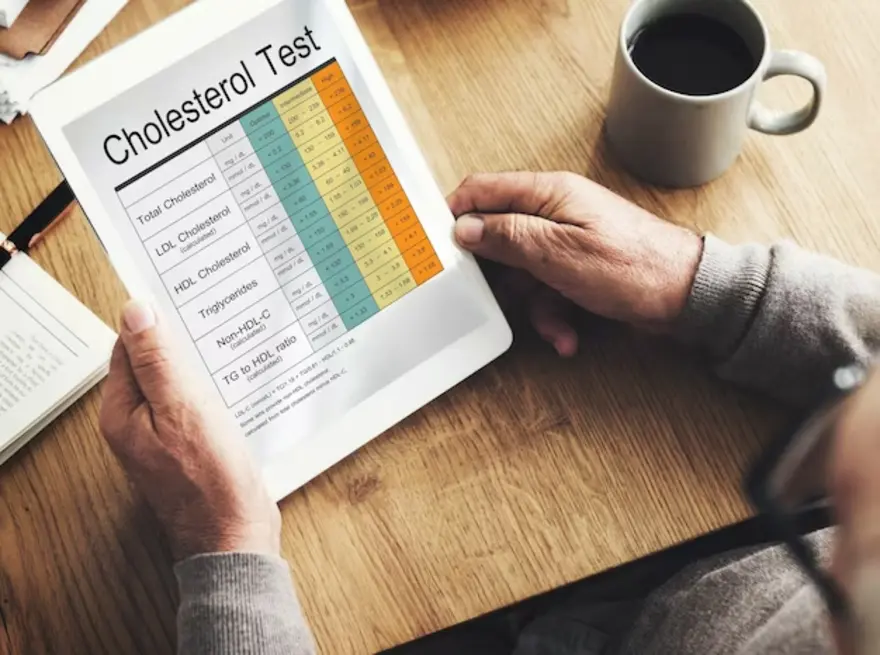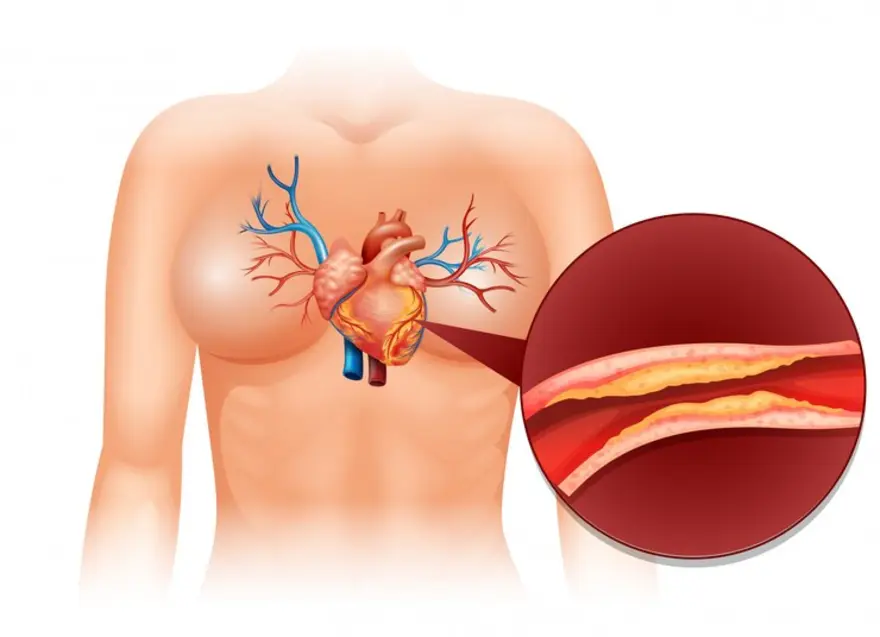Lifestyle
Cholesterol Levels - What You Need to Know
15367 Views
0

Cholesterol is a waxy substance found in your body and certain foods. It plays a crucial role in various bodily functions, but too much "bad" cholesterol (LDL) can increase the risk of heart disease. "Good" cholesterol (HDL) helps remove excess LDL. Managing cholesterol levels through a healthy lifestyle, diet, and, if necessary, medication is vital for heart health.
Read more to know about other factors of Cholesterol and the required total cholesterol normal value. You will also learn about the other cholesterol values in the body.
What is meant by Cholesterol?
Cholesterol is a waxy, fat-like substance that's found in all the cells in your body. Your body needs cholesterol to make hormones, vitamin D, and substances that help you digest foods. Your body makes all the cholesterol it needs but you also get extra cholesterol from the foods you eat. Your body has a system for getting rid of excess cholesterol but too much cholesterol in your blood can raise the risk of heart disease and stroke. This is because cholesterol can build up in the walls of your arteries, forming plaques. These plaques can narrow or block your arteries, making it difficult for blood to flow to your heart and brain.
How do you measure cholesterol levels?
Cholesterol levels are measured with a blood test called a Lipid Panel. This test measures LDL cholesterol, HDL cholesterol, triglycerides, and total cholesterol range in your blood.
To prepare for a lipid panel, you must fast for 9-12 hours before the test. This means not eating or drinking anything but water during that time.
During the test, a healthcare professional will draw blood from a vein in your arm. The blood will be sent to a laboratory for analysis.
Your lipid panel results will be available within a few days. Your doctor will review your results and discuss any necessary lifestyle changes or medications.
Here are the steps involved in measuring cholesterol levels:
- Fast for 9-12 hours before the test.
- Have a blood sample drawn from a vein in your arm.
- Send the blood sample to a laboratory for analysis.
- Review the results with your doctor.
What are the types of cholesterol?
There are two main types of cholesterol:
- Low-density lipoprotein (LDL) cholesterol:
LDL cholesterol is known as "bad" cholesterol because it can build up in the walls of your arteries. It can lead to hardening of the arteries (atherosclerosis), which can increase the risk of heart disease and stroke. The LDL normal value is less than 100 mg/dL (3.4mmol/L).
- High-density lipoprotein (HDL) cholesterol:
HDL cholesterol is known as "good" cholesterol because it helps to remove LDL cholesterol from the arteries. This helps to keep the arteries clear and reduces the risk of heart disease and stroke. The HDL normal value is 40 mg/dL (1mmol/L) or more.
There are other types of cholesterol listed below-
- Very low-density lipoprotein (VLDL) cholesterol: VLDL cholesterol is a type of fat made in the liver and released into the bloodstream. VLDL cholesterol is converted to LDL cholesterol in the bloodstream.
- Intermediate-density lipoprotein (IDL) cholesterol: IDL cholesterol is formed when VLDL cholesterol loses some of its triglycerides. IDL cholesterol can be converted to LDL cholesterol or HDL cholesterol.
- Lp(a) cholesterol: Lp(a) cholesterol is a type of cholesterol that is similar to LDL cholesterol, but it has an additional protein attached to it. Lp(a) cholesterol can build up in the walls of the arteries and increase the risk of heart disease and stroke.
What do your cholesterol numbers mean?
Your cholesterol numbers can help you understand your risk of heart disease and stroke. The four main cholesterol numbers are:
Total cholesterol: This is the total amount of cholesterol in your blood.
LDL cholesterol: This is the "bad" cholesterol that can build up in your arteries and form plaques.
HDL cholesterol: This is the "good" cholesterol that helps remove LDL cholesterol from your arteries.
Triglycerides: This is another type of fat in your blood that can raise your risk of heart disease and stroke.
Here is a breakdown of what your cholesterol numbers mean:
Total cholesterol range-
- Average: Less than 200 milligrams per deciliter (mg/dL)
- Borderline high: 200-239 mg/dL
- High: 240 mg/dL and higher
LDL cholesterol range-
- Optimal: Less than 100 mg/dL
- Near-optimal: 100-129 mg/dL
- Borderline high: 130-159 mg/dL
- High: 160-189 mg/dL
- Very high: 190 mg/dL and higher
HDL cholesterol range-
- Low: Less than 40 mg/dL in men and less than 50 mg/dL in women
- Ideal: 60 mg/dL or higher in men and 55 mg/dL or higher in women
Triglycerides range-
- Normal: Less than 150 mg/dL
- Borderline high: 150-199 mg/dL
- High: 200-499 mg/dL
- Very high: 500 mg/dL and higher
What is the normal serum cholesterol level?
- Total cholesterol normal value for adults: Less than 200 mg/dL
- LDL cholesterol normal range value: Less than 100 mg/dL
- HDL cholesterol normal range value: 40 mg/dL or higher
- Triglycerides: Less than 150 mg/dL
How often should you get your cholesterol checked?
The frequency with which you should get your cholesterol checked depends on your age and risk factors for heart disease and stroke. The American Heart Association recommends that adults aged 20 or older have their cholesterol checked every four to six years. However, if you have any of the following risk factors, you may need to get your cholesterol checked more often:
- Age 45 or older (men) or 55 or older (women)
- Family history of heart disease or stroke
- High blood pressure
- Diabetes
- Smoking
- Obesity
- High triglycerides
- Low HDL cholesterol
Suppose you have other risk factors for heart disease, such as high cholesterol, low HDL cholesterol, or high triglycerides. In that case, your doctor may recommend checking your cholesterol even more often.
It is also essential to talk to your doctor about how often you should check your cholesterol if you take any medications affecting cholesterol levels, such as statins or niacin.
What affects your cholesterol levels?
Your cholesterol levels are affected by several factors, including:
Unhealthy Diet:
Eating high in saturated and trans fats can raise cholesterol levels. Saturated fats are found in animal products, such as red meat, butter, and full-fat dairy products. Trans fats are found in processed foods, such as fried foods and baked goods. It is essential to eat a diet that is low in saturated and trans fats and high in fruits, vegetables, and whole grains.
Lack Of Exercise:
Exercise can help lower your cholesterol levels. Aim for at least 30 minutes of moderate-intensity exercise most days of the week.
Weight:
Being overweight or obese can raise your cholesterol levels. Losing weight can help lower your cholesterol levels.
Smoking:
Smoking can raise your LDL cholesterol value levels and lower your HDL cholesterol value levels. Quitting smoking can help improve your cholesterol levels.
Medical conditions:
Certain medical conditions, such as diabetes, high blood pressure, and kidney disease, can raise cholesterol levels.
Medications Consumed:
Certain medications, such as statins and niacin, can raise cholesterol levels.
Age:
As you get older, the LDL cholesterol range by age changes and levels tend to rise.
Gender:
Men people tend to have higher LDL and lower HDL cholesterol levels than women. Normal cholesterol levels for women may be different.
Genetics:
Your cholesterol levels can also be affected by your genes.
How can you lower your cholesterol?
Eat a healthy diet:
This means eating a diet low in saturated and trans fats and high in fruits, vegetables, and whole grains. Saturated fats are found in animal products, such as red meat, butter, and full-fat dairy products. Eat fruits, vegetables, whole grains, beans, lentils, nuts, seeds, fish, olive oil, and avocados.
Exercise regularly:
Aim for at least 30 minutes of moderate-intensity exercise most days. Exercise can help raise your HDL cholesterol levels and lower your LDL cholesterol levels. It can also help you maintain a healthy weight. Perform walking, running, biking, swimming, dancing, and gardening.
Maintain a healthy weight:
Being overweight or obese can raise your cholesterol levels. Losing weight can help lower your cholesterol levels. Even a tiny amount of weight loss can make a difference.
Quit smoking:
Smoking can raise your LDL cholesterol levels and lower your HDL cholesterol levels. Quitting smoking can help improve your cholesterol levels and reduce your risk of heart disease and stroke.
Manage other medical conditions:
If you have other medical conditions, such as diabetes, high blood pressure, or kidney disease, it is vital to manage them carefully. These conditions can raise your cholesterol levels, so managing them can help lower your cholesterol levels and reduce your risk of heart disease and stroke.
Conclusion
It is important to have your cholesterol levels checked regularly, especially if you have any risk factors for heart disease and stroke. If your cholesterol levels are high, talk to your doctor about how to lower them. With lifestyle changes and medication, you can lower your cholesterol levels and reduce your risk of heart disease and stroke.
To learn more about how you check your cholesterol level, you can contact Metropolisindia’s professionals. They will provide you with the convenience of testing at home and the benefit of accurate test results
 Home Visit
Home Visit Upload
Upload














1701259759.webp)









 WhatsApp
WhatsApp